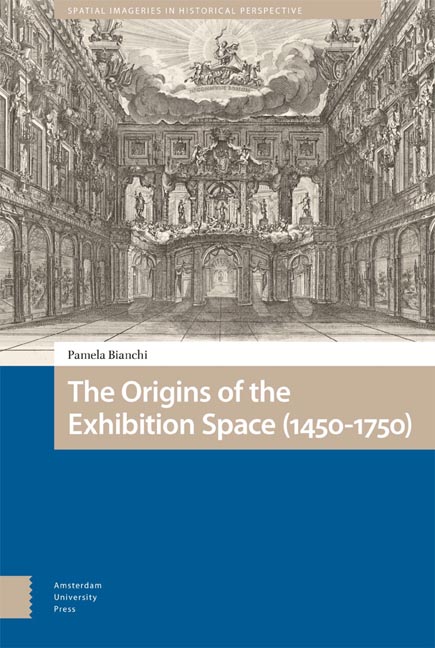1 - Introduction
Published online by Cambridge University Press: 14 October 2023
Summary
Abstract: The introduction presents the topic and the historical and geographical contexts, and traces the two main interconnected themes (the representation of architecture and the history of exhibitions). From the very beginning, it defines the study perspective and the resulting scientific filter – that is, the intention to study those early places, practices, events and habits that have shaped the idea of exhibiting and the imagery of the exhibition space in the early modern period (1450–1750). It sets the methodology and outlines the primary aim of the study: to foster connections between art history, exhibition studies and architectural history, to explore micro-histories and long-term changes, to open new study perspectives and to enhance interdisciplinary historiography.
Keywords: exhibition space, visual imagery, early modern period, methodology
Reasons for the Research
Most essential places for museology are outside the museum. Thus, I would have tried to read the city as a space with a powerful museological connotation associating galleries and supermarkets, factories and churches, streets and underpasses, walls of industrial estates and freight cars, installations of street vendors and parks with statues. I would also have tried to develop the intuition that the principal cultural places are today, as yesterday, of the order of the interstitial, the alternative, the field displacement, the semantic shift rather than that of the institutional, the regulated, the squared and the normed.
The Origins of the Exhibition Space seeks to trace the birth of the idea of exhibition space by studying its visual and written imagery in the early modern period (from the Renaissance to the early eighteenth century). It aims to define a new epistemological characterisation of the exhibition space, free of any institutional and museum logic, but permeable to the social and cultural conditions of the time.
This book is the culmination of a research project stemming from my earlier work on the concept of the exhibition space in the twentieth and twenty-first centuries. This previous research has thoroughly explored this topic and the different connotations and forms it has taken over time. The study has highlighted the need for a new understanding and redefinition of the term “exhibition space”, especially in light of the emerging history of exhibitions and the current interdisciplinary methodology which intersects art history, exhibition studies and architecture theories.
- Type
- Chapter
- Information
- The Origins of the Exhibition Space (1450-1750) , pp. 13 - 28Publisher: Amsterdam University PressPrint publication year: 2023

